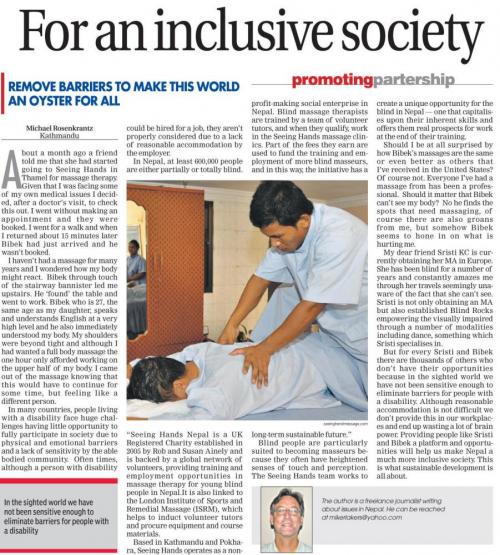
About a month ago a friend told me that she had started going to Seeing Hands in Thamel for massage therapy. Given that I was facing some of my own medical issues I decided, after a doctor’s visit, to check this out. I went without making an appointment and they were booked. I went for a walk and when I returned about 15 minutes later Bibek had just arrived and he wasn’t booked.
I haven’t had a massage for many years and I wondered how my body might react. Bibek through touch of the stairway bannister led me upstairs. He “found” the table and went to work. Bibek who is 27 the same age as my daughter, speaks and understands English at a very high level and he also immediately understood my body. My shoulders were beyond tight and although I had wanted a full body massage the one hour only afforded working on the upper half of my body. I came out of the massage knowing that this would have to continue for some time, but feeling like a different person.
In many countries, people living with a disability face huge challenges having little opportunity to fully participate in society due to physical and emotional barriers and a lack of sensitivity by the able bodied community. Often times, although a person with disability could be hired for a job, they aren’t properly considered due to a lack of reasonable accommodation by the employer.
In Nepal, at least 600,000 people are either partially or totally blind. “Seeing Hands Nepal is a UK Registered Charity established in 2005 by Rob and Susan Ainely and is backed by a global network of volunteers, providing training and employment opportunities in massage therapy for young blind people in Nepal. It is also linked to the London Institute of Sports and Remedial Massage (ISRM), which helps to induct volunteer tutors and procure equipment and course materials.
Based in Kathmandu & Pokhara, Seeing Hands operates as a non-profit-making social enterprise in Nepal. Blind massage therapists are trained by a team of volunteer tutors, and when they qualify, work in the Seeing Hands massage clinics. Part of the fees they earn are used to fund the training and employment of more blind masseurs, and in this way, the initiative has a long-term sustainable future.”
Blind people are particularly suited to becoming masseurs because they often have heightened senses of touch and perception. The Seeing Hands team works to create a unique opportunity for the blind in Nepal - one that capitalizes upon their inherent skills and offers them real prospects for work at the end of their training.
Should I be at all surprised by how Bibek’s massages are the same or even better as others that I’ve received in the United States? Of course not. Everyone I’ve had a massage from has been a professional. Should it matter that Bibek can’t see my body? No he finds the spots that need massaging, of course there are also groans from me, but somehow Bibek seems to hone in on what is hurting me.
My dear friend Sristi KC is currently obtaining her MA in Europe. She has been blind for a number of years and constantly amazes me through her travels seemingly unaware of the fact that she can’t see. Sristi is not only obtaining an MA but also established Blind Rocks empowering the visually impaired through a number of modalities including dance, something which Sristi specializes in.
But for every Sristi and Bibek there are thousands of others who don’t have their opportunities because in the sighted world we have not been sensitive enough to eliminate barriers for people with a disability. Although reasonable accommodation is not difficult we don’t provide this in our workplaces and end up wasting a lot of brain power. Providing people like Sristi and Bibek a platform and opportunities will help us make Nepal a much more inclusive society. This is what sustainable development is all about.










Add new comment